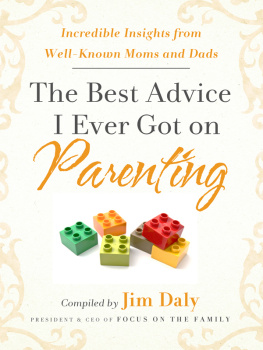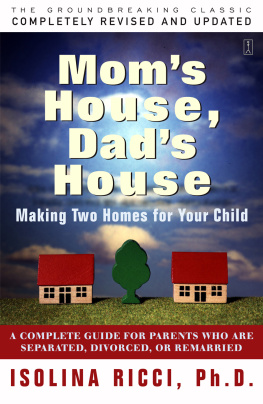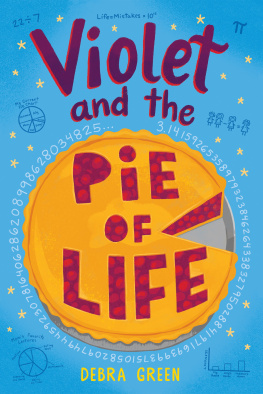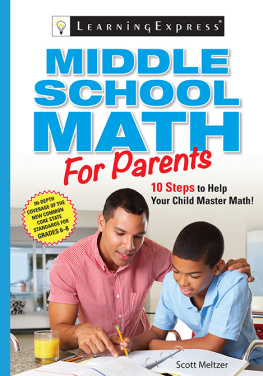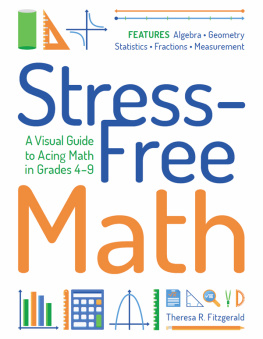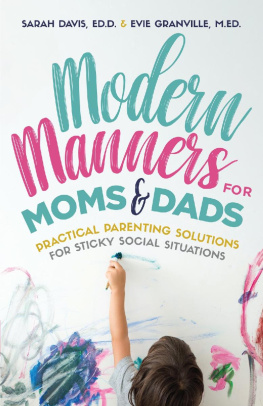Beilenson - Math for moms and dads: a dictionary of terms and concepts-- just for parents
Here you can read online Beilenson - Math for moms and dads: a dictionary of terms and concepts-- just for parents full text of the book (entire story) in english for free. Download pdf and epub, get meaning, cover and reviews about this ebook. publisher: Kaplan Publishing, genre: Children. Description of the work, (preface) as well as reviews are available. Best literature library LitArk.com created for fans of good reading and offers a wide selection of genres:
Romance novel
Science fiction
Adventure
Detective
Science
History
Home and family
Prose
Art
Politics
Computer
Non-fiction
Religion
Business
Children
Humor
Choose a favorite category and find really read worthwhile books. Enjoy immersion in the world of imagination, feel the emotions of the characters or learn something new for yourself, make an fascinating discovery.

Math for moms and dads: a dictionary of terms and concepts-- just for parents: summary, description and annotation
We offer to read an annotation, description, summary or preface (depends on what the author of the book "Math for moms and dads: a dictionary of terms and concepts-- just for parents" wrote himself). If you haven't found the necessary information about the book — write in the comments, we will try to find it.
Beilenson: author's other books
Who wrote Math for moms and dads: a dictionary of terms and concepts-- just for parents? Find out the surname, the name of the author of the book and a list of all author's works by series.
Math for moms and dads: a dictionary of terms and concepts-- just for parents — read online for free the complete book (whole text) full work
Below is the text of the book, divided by pages. System saving the place of the last page read, allows you to conveniently read the book "Math for moms and dads: a dictionary of terms and concepts-- just for parents" online for free, without having to search again every time where you left off. Put a bookmark, and you can go to the page where you finished reading at any time.
Font size:
Interval:
Bookmark:
Math for Moms
and Dads
A Dictionary of Terms and Concepts Just for Parents
Introduction by Suzanne Beilenson
Math Content by Catherine V. Jeremko and Colleen M. Schultz

Chapter 1: How to Use This Book and When to Use
Your Calculator
Begin with a roadmap of this guide and a quick tutorial on the most
efficient way to use calculators.
A guide to the language of mathFrustration often leads to giving up if
your child doesn't know what a word means.
Whether it's arithmetic or honors geometry, these basic rules of math are
a must when tackling any problem.
A word-by-word breakdown of directionsIf you don't even know what
a question is asking, how can you help your child solve it?
Even the most complex math problems are made up of small, easy-to-solve pieces.
Find the most efficient plan for your child's home study, homework, and
test taking with these tips.
Good answers you can give your child to this inevitable question.
How to develop a good working relationship with your child's teacher.
Thirty years ago or so, you sat in math class, staring at the blackboard as your teacher derived the Pythagorean theorem. If you break out into a cold sweat at the memory, you are not alone. Those classroom experiences left many adults math-a-phobic, avoiding all math-related endeavors in the ensuing years. Therefore, it is one of life's little ironies that for all you may have since accomplishedcollege, the job market, parenthoodyou now find yourself back in math class. Only this time, you aren't worrying about your grade but rather your child's success.
As nerve-racking as it may be to watch your child struggle, the real anxiety stems from not knowing how to help. That's where Math for Moms and Dads can make a big difference. As a parent and math teacher, I have sat on both sides of the homework assignment. I know the stress of watching my own kids grapple with math concepts. Yet having worked with students of all abilities, I also know that any child can learn, improve, and earn higher grades in math. Math for Moms and Dads walks you through the techniques and strategies that you, as a parent, can employ to help your child succeed.
Yes, you really can help. However, before tackling irrational numbers or exponents, the road to success begins with the right attitude. Make math a positive experience for your child. For too many students, math class is fraught with confusion, stress, and frustrationfeelings that can overwhelm the learning process. By alleviating the negative feelings that your child associates with math, you will create room for change to happen. There are several ways parents can help lessen the anxiety.
Too often, stepping into math class feels like landing in a foreign country. When language is unfamiliar, reading the signs or even having a conversation becomes arduous. I have had students panic when they see the word integer or identity or inverse. Why? Because it is virtually impossible to answer a question correctly if you're not sure what's being asked. Unlike Spanish or French class, where students must memorize vocabulary, math teachers rarely drill students on the meaning of math terms.
Therefore, the first step toward making your child more comfortable and confident in math class is to help improve his or her math fluency. Use the vocabulary section of Math for Moms and Dads to review and clarify all of the terminology you need to know to speak math with your child. The more often you use these math terms with your child, the more easily fluency will come for both of you.
A second approach for making math a positive experience is to model the behavior you want to see in your child. Too often, I hear parents saying I can't do math, or I hate math. Try not to make your problem your child's problem. If you, as your child's role model, can't do math, then the first time your child encounters difficulties in math class, the response will be I can't do math, either. The primary purpose of Math for Moms and Dads is to help build your confidence, because a parent's own math phobia single-handedly creates the biggest obstacle to kids' success.
Third, cheer your child onespecially when the going gets rough. There's a big difference between finding math difficult and not being able to do it. I have seen the greatest confidence boosts in students who do not have a natural facility with numbers but who have had to work really hard in math class. Every time students learn that they have the capacity to take on a challenge and win, they learn a giant life lesson and confidence soars. That is the great value in learning how to do something hard. The next time a challengeacademic or otherwisepresents itself, your child will be more likely to say, I can do this. If I learned how to use the quadratic formula, I can do this, too. Keep your child motivated during the hard moments by always applauding efforts. It helps as much in math class as it does on the soccer field!
Finally, help your child see the connections between math and everyday life. The less abstract math is, the more manageable it becomes. As a parent, I always try to illustrate for my kids how math surrounds us everywhere in our daily lives. In my house, baking cupcakes is proof of the commutative law of multiplication: three rows of four cupcakes equal four rows of three cupcakes. Going to Starbucks is a trip on the coordinate plane: our house is the center of the universe at (0, 0), and coffee is three blocks up and two blocks left at (3, 2). Putting money in a savings account is a geometric progression that really pays off! Soup cans are cylinders, cereal boxes are prisms, and basketballs are spheres.
The next time you go out for dinner, let your child check the bill for errors or figure out a 15 percent tip. Ask him to double the recipe quantities for Aunt Martha's famous chocolate cake. Moreover, if your child ever asks How much longer? on a road trip, simply state the time you left, the distance of your destination, and your average speed.
The more you make math an evident part of your child's life, the less math class will seem like a foreign country. Help your child have a great experience and feel comfortable by learning the language, being a positive role model, and making math a tangible part of life. You will both reap the rewards.
As important as it is for math to be a positive experience, establishing good habits will take your child further down the road to success. These good habits include excellent computation, showing all your work every time, and a disciplined homework routine.
Good habits matter in math. While mathematics is theoretically based, school-level math is rather concrete. It is a contained world. The problems always work out. They always rely on information in the chapter. There is always a right answer. It is generally far more mechanical than theoretical. Students can earn good grades in math by mastering procedures instead of being intellectually creative. That mastery requires good habits.
In fact, I have seen kids with a tenuous grasp on a particular concept still ace a test because they have become master technicians. As a parent, you can help your child do the same.
Computation
You would never expect a middle school student to read Aristotle or Tolstoy, but you prepare them for the task by giving them a foundation in grammar, vocabulary, and literary concepts. The same holds true for math. Higher mathfrom algebra to calculusrequires a strong foundation, and students have to acquire certain skills before meeting the challenge. The building blocks are not conceptual. They are computational. They are arithmetic, fractions, decimals, exponents, and square roots.
Font size:
Interval:
Bookmark:
Similar books «Math for moms and dads: a dictionary of terms and concepts-- just for parents»
Look at similar books to Math for moms and dads: a dictionary of terms and concepts-- just for parents. We have selected literature similar in name and meaning in the hope of providing readers with more options to find new, interesting, not yet read works.
Discussion, reviews of the book Math for moms and dads: a dictionary of terms and concepts-- just for parents and just readers' own opinions. Leave your comments, write what you think about the work, its meaning or the main characters. Specify what exactly you liked and what you didn't like, and why you think so.

